Health Insurance Costs Stress US Whether We’re Rich or Not / and Why a $0 Budget for CFPB Matters for Healthcare

Health care costs cause anxiety for U.S. adults, regardless of their affluence, we learn in Uncertainty About Healthcare, the latest Stress in America poll from the American Psychological Association. The big stat is that 2 in 3 Americans say the cost of health insurance is a stressor for them or their loved ones, whether the person earns more or less than $50,000 a year. Underneath that top-line are some demographic differences. Millennials are most concerned about access to mental health care compared with Boomers and older adults. Reproductive care access is of most interest to Millennials and Gen Xers. Two-thirds
Hug Your Physician: S/He Needs It – Listening to the 2018 Medscape National Physician Burnout & Depression Report

Two in five U.S. physicians feels burned out, according to the Medscape National Physician Burnout & Depression Report for 2018. This year, Medscape explicitly adds the condition of “depression” to its important study, and its title. In 2017, the Medscape report was about bias and burnout. Physicians involved in primary care specialties and critical care are especially at-risk for burnout, the study found. One in five OBGYNs experience both burnout and depression. Furthermore, there’s a big gender disparity when it comes to feeling burned out: nearly one-half of female physicians feel burnout compared with 38% of male doctors. Being employed by
Sleepless in America: Prescribing Sleep at CES 2018

Las Vegas is known for glitzy neon lights brightly shining along the strip and casinos without clocks reminding us of the time, stimulating us to stay awake at all hours of day or night. But inside the Sands Convention Center are a couple dozen technologies and connected things designed to put us to sleep, which is a growing digital health category at the annual CES. Form factors for sleep-things at CES 2018 include masks, beds, lights, apps, and even a huggable sleep “robot.” Why is sleep seeing such a huge influx on the consumer tech-supply side? Because there’s growing, mainstream
Healthy Living in Digital Times at CES 2018

Connecting Life’s Dots, the organization Living in Digital Times partners with CES to deliver conference content during the show. At CES 2018, LIDT is connecting a lot of dots to help make health streamline into daily living. Robin Raskin, founder, kicked off LIDT’s press conference setting the context for how technology is changing lifestyles. Her Holy Grail is to help make tech fun for everybody, inclusive for everybody, and loved by everybody, she enthused. LIDT has been a presence at CES for many years, conceiving the contest the Last Gadget Standing, hosting tech-fashion shows with robots, and supporting a young innovators
Stress is US: Health Care Is the #1 Stressor in America
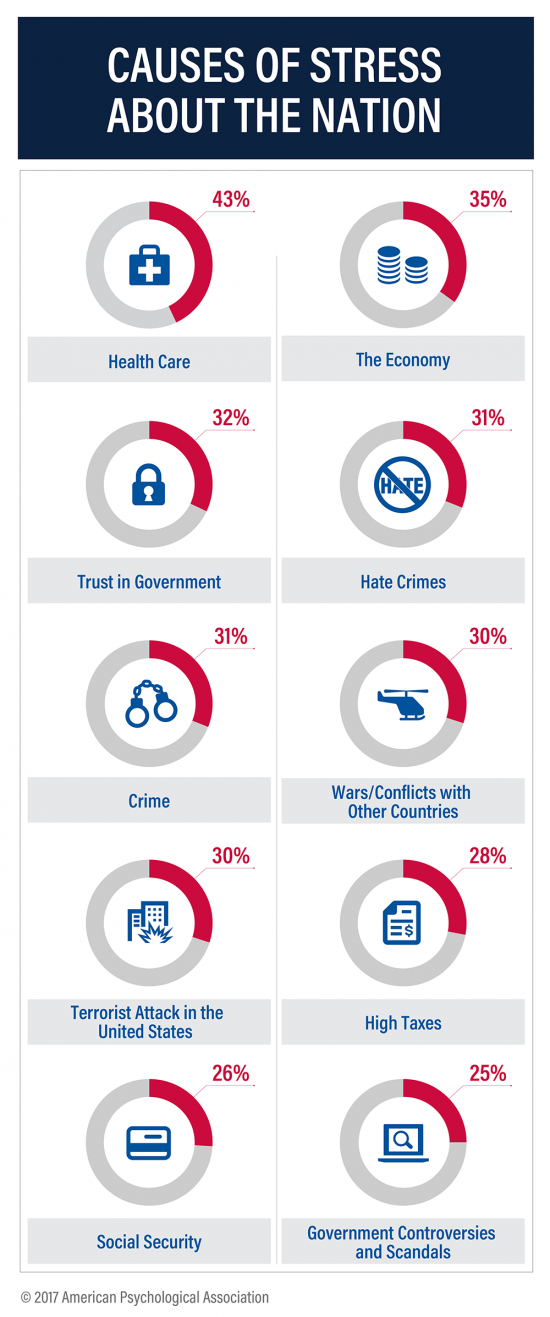
Above the economy, trust in government, crime, war, terrorism, and taxes, health care is the top cause of stress in America. For ten years, the American Psychological Association has gauged Americans’ collective mood in their ongoing study, Stress in America. The latest report is The State of Our Nation, published this month, finding that we’re at the “lowest point in our nation’s history” according to 59% of Americans. The 2016 national election in the U.S. raised the stress-stakes, when APA released a stress study we discussed here in Health Populi. The election season was a source of stress for 52%
12% of Americans Have At Least 5 Chronic Conditions and Spend 41% of Healthcare Dollars
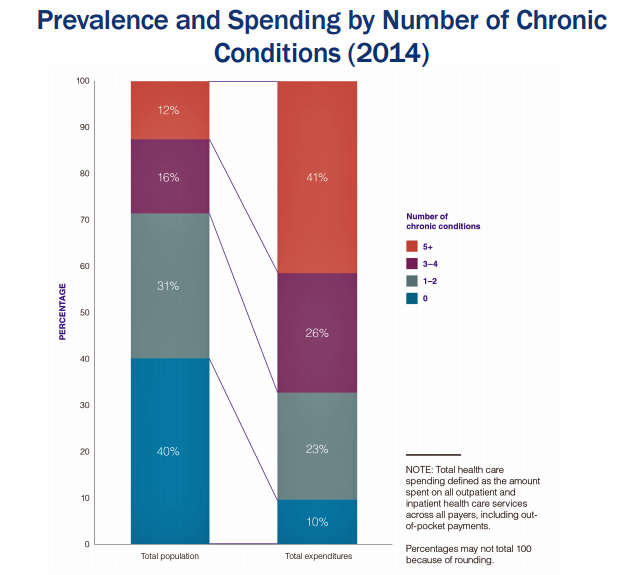
Forget about the 80/20 Rule. Welcome to the 41/12 Metric: 12% of U.S. adults account for 41% of healthcare spending in America, calculated by RAND Corporation in their new report, Multiple Chronic Conditions in the United States. RAND’s report quantifies the growing chronic care landscape in America that will be a burdensome legacy for younger Americans in terms of financial and social costs. First, a definition: RAND defines a chronic condition as a physical or mental health issue that lasts more than one year and causes functional restrictions or requires ongoing monitoring or treatment. Older adults are more likely to
The Mental Health Risks of Social Media for Young People
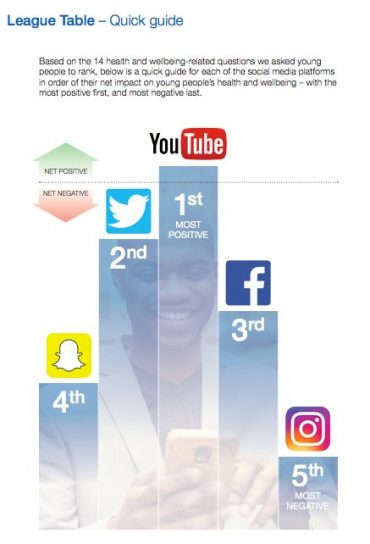
As addictions go, social media can be more addictive than cigarettes or alcohol, according to a report from the Royal Society for Public Health (RSPH), #StatusOfMind, on social media and young people’s mental health and wellbeing. With 91% of people age 16-24 using the internet for social networking, that addiction connects to rising levels of anxiety and depression, the Royal Society asserts, recommending some calls to action to address this public health problem head-on. While this report focuses on the population in the United Kingdom (UK), the social media trends are at least as prominent in the US. The calls
Learning Health Behavior Change From the Guru Prochaska
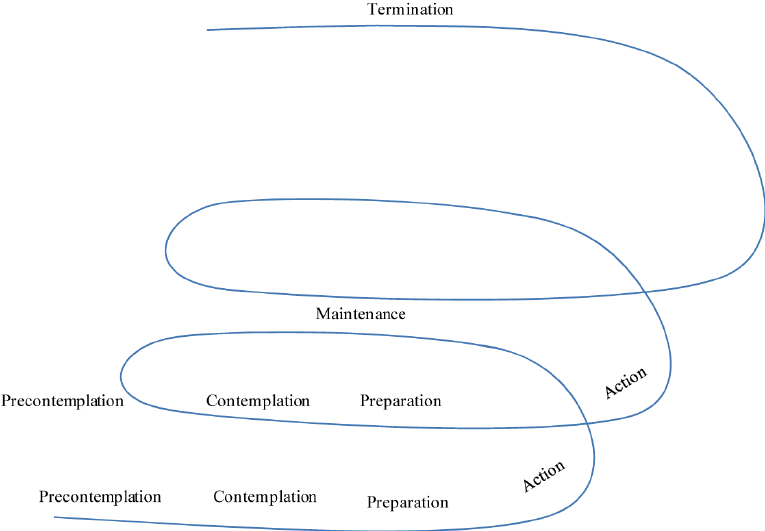
For us mere humans, behavior change is hard. Changing health behaviors is really tough. Enter Dr. James Prochaska, who has been at the forefront of researching and understanding human and health behavior for several decades. He’s the father of the Transtheoretical Model of Behavior Change (TTM). I have the honor today to listen live to Dr. Prochaska’s talk at the Health Integrated EMPOWER conference in St. Petersburg, Florida, where I’ll be addressing attendees on the new health consumer tomorrow. “Empower,” indeed. Dr. Prochaska is all about how people have good intentions to make good health decisions, but we all slip and
A New Risk Factor For Mental Health: Climate Change
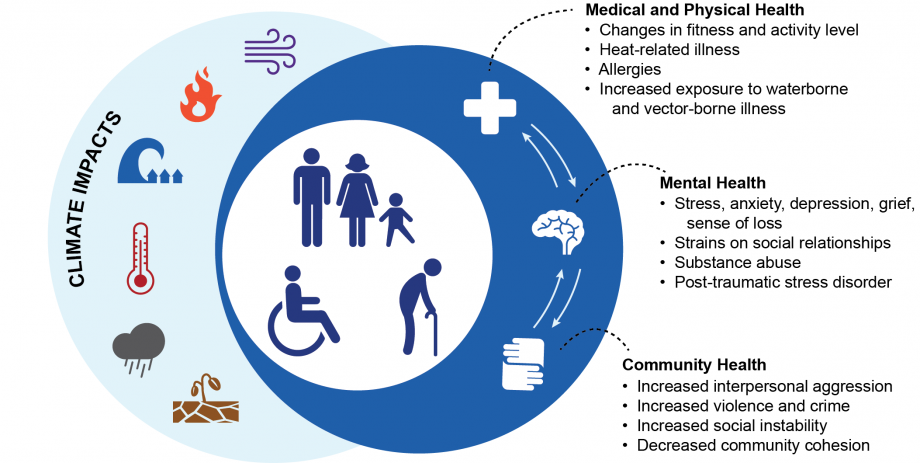
We make our health across many dimensions: via nutrition, safe physical/built environments, financial wellness, education, and the environment among them. In this last category, the environment, new research finds that climate change has a significant impact on health. The report, Mental Health and Our Changing Climate: Impacts, Implications, and Guidance, was sponsored by the American Psychological Association in conjunction with Climate for Health and ecoAmerica. “Climate change-induced severe weather and other natural disasters have the most immediate effects on mental health in the form of the trauma and shock due to personal injuries, loss of a loved one, damage to
Color Me Well – Coloring Books As Rx for Wellness
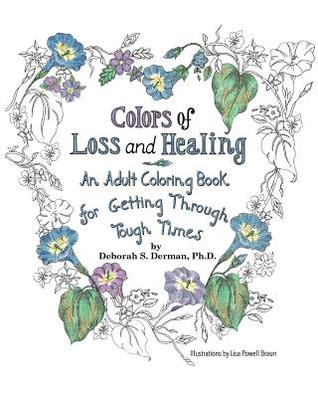
Coloring books are best sellers in bookstores, craft merchandisers, newspaper stands, and on Amazon. Now, they’re joining the health and wellness world. The market growth of coloring books has been recognized in national media like the Washington Post, who called the phenomenon, “a bright spot in the financial results of publishers and retailers alike.” Nielsen Bookscan estimated that 12 million were sold in 2015, up from 1 million in 2014. Publishers Weekly covered the craze in November 2015. A Forbes column said, “The adult coloring craze continues and there is no end in sight.” Some of the mental health benefits
Death Rates Rise For Middle-Age White Men: Economics and Mental Health in America
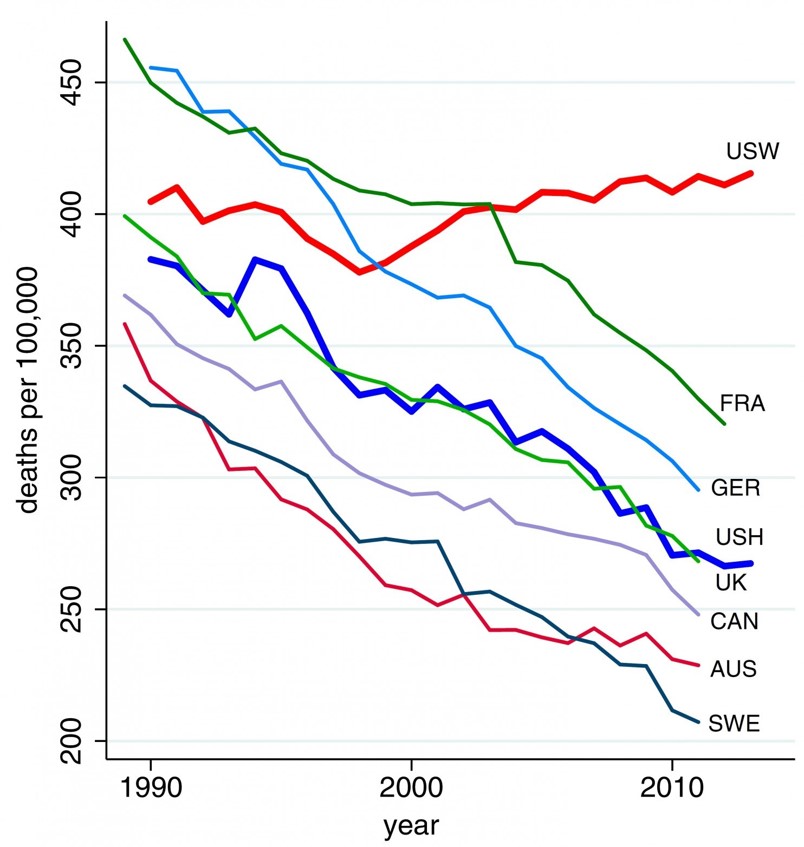
Shocking statistics were published in this week’s Proceedings of the National Academy of Sciences showing rising death rates for middle-age men. The major causes: suicide, drug and alcohol poisoning, and liver diseases. The line chart illustrates the death rates per 100,000 population of U.S. whites (“USW”), the top line on the graph, compared with 45-54 year old men in France, Germany, the United Kingdom, Canada, Australia, and Sweden — along with U.S. Hispanic males (“USH”) — for whom death rates have fallen since 1990. The authors note that the increase in midlife mortality is only partly understood. Increased availability of
The Internet of Things in Health: McKinsey Sees $1.6 T Value
‘Tis the summer of big, smart reports covering the Internet of Things (IoT) impact on health and fitness. Just this month, three of these missives have come to my inbox, and they all contribute sound thinking about the topic. Today, tomorrow and Friday, I’ll cover each of these here in Health Populi. We begin with McKinsey Global Institute’s The Internet of Things: Mapping the Value Beyond the Hype. [In full disclosure, I was an outside adviser to the MGI team members who focused on the human/health and fitness aspects of this report, and thank MGI for the opportunity to provide
Color us stressed – how to deal
Coast-to-coast, stress is the modus vivendi for most Americans: 55% of people feel stressed in every day life, according to a study from Televox. A Stressful Nation: Americans Search for a Healthy Balance paints a picture of a nation of physically inactive people working too hard and playing too little. And far more women feel the stress than men do. 64% of people say they’re stressed during a typical workday. 52% of people see stress negatively impacting their lives. And nearly one-half of people believe they could better manage their stress. As a result, physicians say that Americans are experiencing negative
Gamification in health – make the person the quarterback
Games are part of peoples’ lives in the 20-teens. Gamification has been used in military and business training and now is a growing method to help change peoples’ behavior across a variety of issues — health, among them. But it’s not all “fun and games” when it comes to succeeding in applying gaming methods in health, according to Gaming to Engage the Healthcare Consumer, a report from ICF International. ICF’s roots are in the defense industry, and the team that wrote this paper together have decades of experience in military applications. These learnings can be quite useful when translated into the
Mobile health apps – opportunity for patients and doctors to co-create the evidence
There are thousands of downloadable apps that people can use that touch on health. But among the 40,000+ mobile health apps available in iTunes, which most effectively drive health and efficient care? To answer that question, the IMS Institute for Healthcare Informatics analyzed 43,689 health, fitness and medical apps in the Apple iTunes store as of June 2013. These split into what IMS categorized as 23,682 “genuine” health care apps, and 20,007 falling into miscellaneous categories such as product-specific apps, fashion and beauty, fertility, veterinary, and apps with “gimmicks” (IMS’s word) with no obvious health benefit. Among the 23,682 so-called
Living paycheck to paycheck: what it means for health
While 50% of Americans feel they have a sound financial position, the other half is living paycheck to paycheck. 8% say they can’t even pay for essentials. The second annual Allstate “Life Tracks” Poll finds American adults split between have’s and have not’s, with even the “have’s” feeling less than financially literate. There is an equal split between people who feel they’re in an “excellent” or “good” financial position compared with those who feel they’re in financially “fair” or “poor” shape. Men feel more financially secure than women; 3 in 4 single parents feel less well-off compared to the average
Battle of the (wrist)Bands at the Digital Health Summit, 2013 CES
One of the fastest-growing segments at the 2013 Consumer Electronics Show in Las Vegas this week is digital health. And within that segment, there’s a battle brewing for what technology companies seem to think is the most valuable part of real estate on the human body: the wrist. I counted at least fifty products as I cruised aisles 26000-27000 in the South Hall at the Las Vegas Convention Center that had wristbands, usually black, plastic or rubbery, and often able to click in and out of the band for use in-hand, in pocket, or in a few cases, on a
Wired health: living by numbers – a review of the event
Wired magazine, longtime evangelist for all-things-tech, has played a growing role in serving up health-tech content over the past several years, especially through the work of Thomas Goetz. This month, Wired featured an informative section on living by numbers — the theme of a new Wired conference held 15-16 October 2012 in New York City. This feels like the week of digital health on the east coast of the U.S.: several major meetings have convened that highlight the role of technology — especially, the Internet, mobile platforms, and Big Data — on health. Among the meetings were the NYeC Digital Health conference, Digital
Lab tests and knowing our numbers can inspire patient engagement
One-half of the members of Kaiser Permanente use the plans’ personal health record system, MyHealthManager. The most-used function of MyHealthManager is accessing lab results, according to KP. Now that Quest, the lab and health information company, has launched the mobile phone app, Gazelle, more health citizens will have access to lab test results. This could be a health-activating opportunity inspiring patient engagement. While Gazelle is a fully functional personal health record (PHR), it’s the connection to lab test results that’s the lightbulb moment. PHRs have been available to health consumers for over a decade. There are millions of users of
The Online Couch: how “safe Skyping” is changing the relationship for patients and therapists
Skype and videoconferencing have surpassed the tipping point of consumer adoption. Grandparents Skype with grandchildren living far, far away. Soldiers converse daily with families from Afghanistan and Iraq war theatres. Workers streamline telecommuting by videoconferencing with colleagues in geographically distributed offices. In the era of DIY’ing all aspects of life, more health citizens are taking to DIY’ing health — and, increasingly, looking beyond physical health for convenient access to mental and behavioral health services. The Online Couch: Mental Health Care on the Web is my latest paper for the California HealthCare Foundation. Among a range of emerging tech-enabled mental health
The Online Couch: how the Internet and mobile are changing mental and behavioral health care
Therapy is now a click away, whether on a computer, a smartphone or a tablet. Drs. Freud, Ellis and Beck, heads-up: the Internet is the new couch of psychiatry. That is, at least for people with mild to moderate depression and those with anxiety, as I report in my latest paper for the California HealthCare Foundation, The Online Couch: Mental Health Care on the Web. Many factors are aligning that make therapy online an effective extension of face-to-face therapy for the right patients at the right time in the U.S.: An undersupply of psychologists, psychiatrists, and other therapists, especially in rural and





 I'm in amazing company here with other #digitalhealth innovators, thinkers and doers. Thank you to Cristian Cortez Fernandez and Zallud for this recognition; I'm grateful.
I'm in amazing company here with other #digitalhealth innovators, thinkers and doers. Thank you to Cristian Cortez Fernandez and Zallud for this recognition; I'm grateful. Jane was named as a member of the AHIP 2024 Advisory Board, joining some valued colleagues to prepare for the challenges and opportunities facing health plans, systems, and other industry stakeholders.
Jane was named as a member of the AHIP 2024 Advisory Board, joining some valued colleagues to prepare for the challenges and opportunities facing health plans, systems, and other industry stakeholders.  Join Jane at AHIP's annual meeting in Las Vegas: I'll be speaking, moderating a panel, and providing thought leadership on health consumers and bolstering equity, empowerment, and self-care.
Join Jane at AHIP's annual meeting in Las Vegas: I'll be speaking, moderating a panel, and providing thought leadership on health consumers and bolstering equity, empowerment, and self-care.